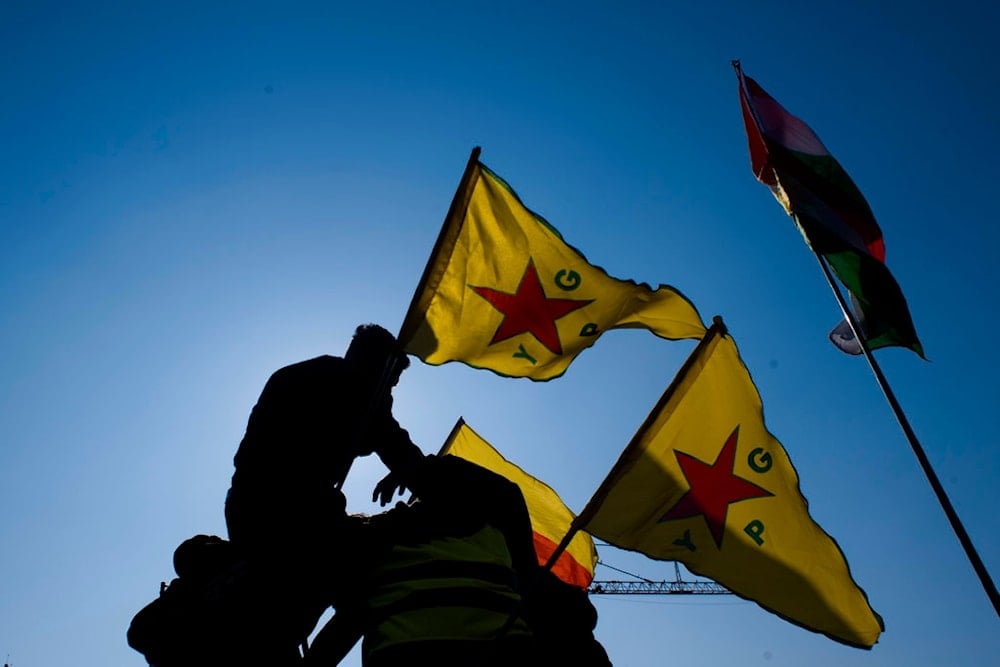Syrian MoD open to talks with Kurds, threatens action if talks fail
UN envoy to Syria, Geir Pedersen, expressed hope during a press briefing in Damascus on Wednesday that the conflicting parties would allow space for a diplomatic resolution "so that this does not end in a full military confrontation".
-

People wave with flags showing Kurdish symbols as they attend a demonstration of some thousand protestors against the Turkish offensive targeting Kurds in Afrin, northern Syria, in Berlin, Germany, Saturday, March 3, 2018. (AP)
Syria's Defense Minister, Murhaf Abu Qasra, announced on Wednesday that the government is open to negotiating with the Kurdish-led Syrian Democratic Forces (SDF) about integrating them into the national army. However, he warned that military action remains an option should these talks fail.
"The door to negotiation with the (Kurdish-led Syrian Democratic Forces) is currently open," Abu Qasra stated. "If we have to use force, we will be ready."
This development follows a meeting last month between an SDF delegation and Ahmed al-Sharaa, Syria's interim leader and head of the Hayat Tahrir al-Sham (HTS) group, which led the offensive that ousted President Bashar al-Assad. During an interview with Al Arabiya, Sharaa proposed incorporating the Kurdish-led forces into the national military to ensure that weapons are "in the hands of the state alone."
Read more: Al-Sharaa holds talks with SDF amid intense clashes in Syria's north
The SDF, backed by the United States, played a central role in expelling the Islamic State group from its last territory in Syria in 2019. However, the coalition's formation and continued operations have been widely viewed as a strategy to facilitate and consolidate the US military presence in Syria, a presence that violates Syria's territorial integrity and sovereignty. The SDF has since retained control over much of the oil-rich northeastern region, where it has exercised de facto autonomy for over a decade.
Abu Qasra dismissed offers of oil from the SDF, asserting that the government's priority is restoring full sovereignty. "They offered us oil, but we don't want oil, we want the institutions and the borders," he said.
Turkiye's role in the conflict
The SDF's relationship with Turkiye further complicates the situation. Ankara accuses the SDF's primary component, the YPG, of having ties to the Kurdistan Workers' Party (PKK), a group labeled a terrorist organization by Turkiye.
Over the past year, Turkish-backed forces have launched offensives against SDF-controlled territories, seizing areas in northern Syria.
Earlier this month, then-US Secretary of State Antony Blinken acknowledged Turkiye's concerns and stated that efforts were underway to prevent further escalation.
Read more: France-Turkiye relations sour as SDF gains French-linked drone bombers
Diplomatic efforts
UN envoy to Syria, Geir Pedersen, expressed hope during a press briefing in Damascus on Wednesday that the conflicting parties would allow space for a diplomatic resolution "so that this does not end in a full military confrontation".
Pedersen stressed that both Washington and Ankara play critical roles in fostering a peaceful negotiation environment.
"We are looking for the beginning of a new Syria and hopefully that will also include the northeast in a peaceful manner," he said.
While talks between Damascus and the SDF signal a potential pathway toward reintegration, the threat of conflict looms large if negotiations falter, leaving the future of northeastern Syria uncertain.

 3 Min Read
3 Min Read








